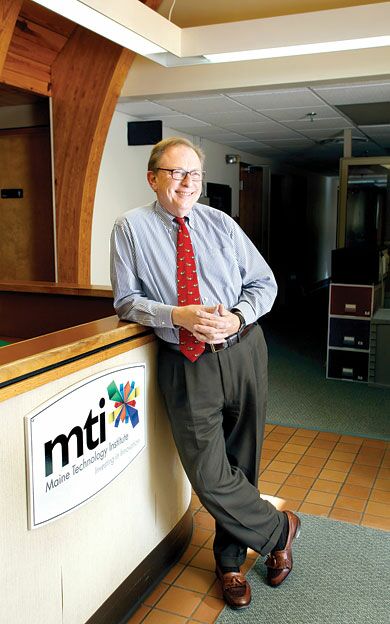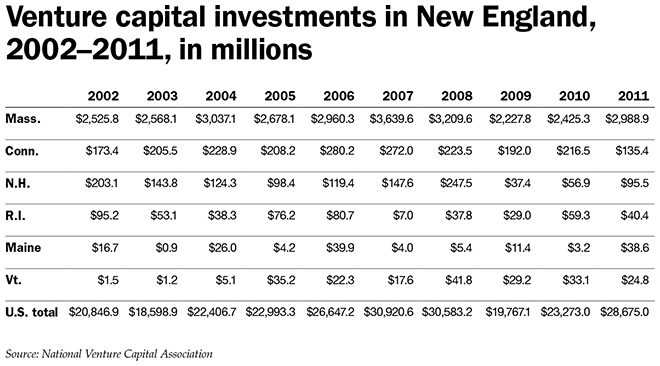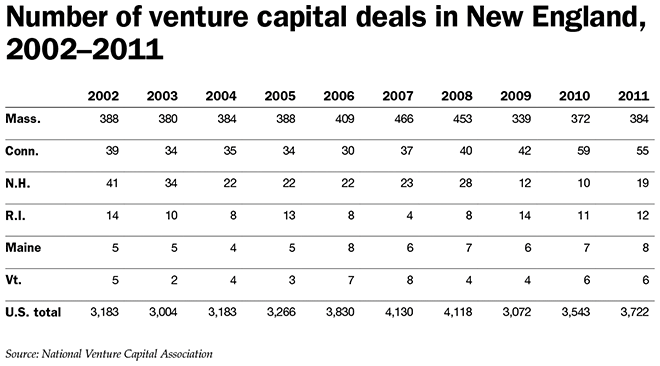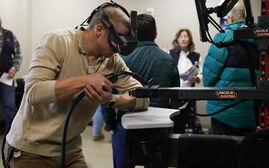Bob Martin pushes MTI to new heights
In September, Maine's Senate confirmed Robert Martin as the new head of the Maine Technology Institute. Martin, the former managing partner of Newcastle consultancy Strategic Equity Partners LLC, has big plans to get more exposure for MTI's portfolio companies and to grow an innovation economy in Maine. He talked about his goals recently with Mainebiz.
Mainebiz: Do you plan to change any priorities at MTI?
Martin: Our strategy is focused around three things. We fund companies; we connect them to the resources and tools they need to be successful; and we help them grow their enterprise so they are successful. So our emphasis isn't just on funding; we very much want the companies in our portfolio to succeed. The reason is that our money is not free. When you win a development award or you secure a development loan from us, there's a point where you take your product to the market and you are sustaining sales revenues, then you are obligated to pay MTI back. We're not philanthropic. We're very much a business investment organization.
But the key is that we operate in a space of funding where nobody else is present. If you have an idea or technology and you want to develop it, a commercial lender is not going to listen to you, a venture capitalist is not interested in you until you actually begin to commercialize your product, and an angel isn't interested in you until you've actually proven the value of your technology. So unless you reached out to brothers and sisters and grandma, you're not likely to get funding to develop your technology unless there's an organization like MTI. That's why we exist — to get companies out of the box, help them prove the value of their technology, help them grow to the step when they're then able to engage in a serious conversation with a venture capitalist or other investor.
The other thing we want to do is expose the companies in our portfolio to larger companies and other investors not just in the state of Maine, but outside the state of Maine. There's a remarkable array of technology under development here that, if given the chance to succeed, has profound implications in terms of business, health, and in some cases, the health of our planet.
Do you feel you're getting enough applications or do you need to stir the pot?
We are doing exactly that. Quite often we're constrained by the fact that not as many people know about the funding opportunities as we would like. For example, we're reaching out to the commercial banking community to make sure commercial lenders and banks across the state are fully aware of the suite of funding opportunities that we have. Typically, if you're an entrepreneur and are not very savvy in the financing landscape, you have an idea and the first person you think about approaching is your local banker. That's not something a commercial lender is going to fund. What we want to avoid is that person going to a commercial lender, being turned down, but not being given some direction as to where they might secure that funding. The SBA [Small Business Administration] and SBDC [Small Business Development Center] are aware of our programs and do steer people to us, but the commercial lending community needs to learn more about what we do.
The second thing is we're very focused on developing higher quality, more active deal flow in the state. Part of that has to do with developing a culture of innovation. In some areas of the country that's fairly robust if you look at the Research Triangle Park or the 128 Corridor in Cambridge and Silicon Valley. We're beginning to develop that at a more robust level here in this state, and we need to do more of that so that entrepreneurs who have ideas and who may be stuck somewhere in the willywacks of the state are aware of and have access to the programs we have under way. And then once you're into our portfolio, we will help you navigate into other opportunities for financing as your enterprise grows.
Are you working with any of the university business programs or with entrepreneurial competitions?
We're very close to those programs at the University of Maine and the University of Southern Maine. We participated with Colby on a program they do and with Husson in terms of their classes on entrepreneurship. One of the things I'd like to create in MTI is a venture fair where the companies in our portfolio that may be at an early stage have the opportunity to present their idea, business concept and technology to outside folks who will evaluate it. Some of that already exists here in the state through the Maine Angels and through the Small Enterprise Growth Fund. Companies that come through the MTI portfolio process are well received by those organizations because they know that with our assistance and funding the companies are beginning to get structure and focus and have developed their technology to the point where it's able to head toward market.
How would the venture fair run?
The model I like is the one I'm familiar with at the North Carolina Council for Entrepreneurial Development in Research Triangle Park. They alternate between a school at Duke and a school at the University of North Carolina and it's an annual, robust affair. We have companies at an early stage of development that would benefit from that. The key thing is making sure that these companies have the opportunity to be exposed to both a wider audience that would have use for the technology perhaps in their own companies in terms of a joint venture or a licensing opportunity and/or to the venture capital community that is ready and willing to make an investment in the company.
You're going to Scotland for an investor's conference. What do you hope to gain from it?
I'm going to be participating in a conference in Edinburgh, Scotland, in January where I will have the opportunity to present to a group of European investors who are interested in technology in the cleantech and alternative energy sectors. So we have a number of clients in our portfolio who are well positioned to engage in that market and in fact some MTI companies are already doing work in Europe. The biggest problem we have at MTI is increasing the quality of our deal flow and then making sure that as many people as possible know about the kinds of technology and companies that are here in Maine.
What are your goals for MTI?
The one goal that I have that we're really trying to accelerate is that historically about 37% of the for-profit companies that we've invested in have successfully commercialized their products. Our goal is to increase that to at least 50% in the next couple years and to continue to accelerate that. And the heart of that goes to the point I made earlier about increasing the quality of the ideas that we invest in in a stage that can be commercialized. A lot of technology development takes time to gel and it really depends on what you do.
In the last round of award applications, for example, Pika Energy has developed a wind turbine system that will allow a homeowner to completely install electricity for less than $8,000. The key thing they developed is an inverter that can translate the electricity that is collected by solar or wind turbines into the form that can be used by a household. They are poised to refine the development of their turbine, but they have already lined up potential sales opportunities in other parts of the country where wind is plentiful and the price point of the energy they're talking about makes wind energy a much more affordable option for households to install. The typical price point is now north of $20,000 for a household, so if you drop it down to $8,000 that begins to change the dynamic of that market. We're looking at receiving some applications from folks who have developed different technologies for capturing the energy from the sun that will again bring the price point down on solar energy to a point that it can be seriously evaluated by many households and farms across the country. So as technology develops and you're able to harness the developments that others have made and adapt them, that makes for tremendous opportunity.
Did you have a role in getting venture capitalists introduced to companies?
One of hidden gems at MTI is a role called entrepreneur in residence. We have Roger Brooks, who is an experienced CEO and investor, identifying companies that have strong potential and helping those companies make connections with people who could provide advice and who would be in a position to create an investment in them.
Is this something new, or have you been doing this all along?
We're doing it in a much more concentrated way now. We have another program that we'll kick off in January that will be called MTI Connect where we will bring together the teams of all or our portfolio companies. We'll have an evening where we'll have a speaker who will talk about some aspect of growing a company. But the key is the opportunity for all those people to get together and make connections with one another. We saw that happen at the recent MTI mixer [in Lewiston] where entrepreneurs and people who didn't know about each other came across the aisle and talked to each other about issues that they share. The more we can do that, then the greater the body of knowledge is within our portfolio companies about how to navigate the whole treacherous rapids of building a company, financing and taking your product to market.
How often will those events happen?
At least quarterly with MTI Connect and the CEOs. There will be different events at different times for those different audiences. We don't have a spiffy marketing name for the CEO group right now.
Is there anything else in planning?
The other thing we're doing is trying to work as closely as possible with universities to help increase the exposure the companies have to the kinds of technology and research that's under way at universities. A great example of this is with TexTech Industries, which discovered that some years ago a professor at the University of Maine at Orono had done some research into a particular type of textile. TexTech found that paper and did some work around it and with the help of the university and their own R&D staff developed their core matrix fabric and technology that is now used in the production of material that makes protective vests for law enforcement officers. So now 70% of the law enforcement officers in this country are wearing protective vests made with fabric out of TexTech made from research out of UMO. That same fabric is being used for soldiers' protective armor in the Middle East and in covering the bottom layer of armored personnel carriers to protect the fuel bladder from damage or disaster from unidentified explosive devices. So here's a Maine company engaged in the textile business using research that came out of the university and their research to develop textiles that are high performance and that have a huge advantage. That kind of thing is what we want to try to amplify and grow.
You mentioned the MTI Connect and CEO programs. Is there anything else coming down the road in the next year?
Over the next year we want to increase the effectiveness of MTI's investments and to grow the number of companies that are successful. One of the numbers that haunts the heck out of me is from the studies of PricewaterhouseCoopers and the National Venture Capital Association showing that the amount of venture capital investment in each state from 2001 to 2009. In the state of Maine during that time there was $5.09 per capita invested in Maine by outside venture capital investors. We were very close to the bottom. During the same period of time investment in New Hampshire companies was $32, in Vermont a little over $20 and in Massachusetts $482 per capita. So the exposure we have in this state to outside investment is not as robust as it should be given the technology in Maine. We have a lot of work under way to increase folks' knowledge about that.
Are you trying to expand funding sources?
There are no new public funds available for MTI now other than what's on the table. We are taking a look at other funding opportunities. I'm not ready to talk about that. It's a topic we're actively exploring and will put together a program we will announce in the next month or so.
The other thing is we work closely with the Blackstone Initiative. The Blackstone folks can be helpful in creating a culture of innovation and entrepreneurship. We have some of that in the state, but there's no critical mass. MTI represents a huge value for the investment it receives.
Lori Valigra, a writer based in Harrison, can be reached at editorial@mainebiz.biz.
Read more
















Comments